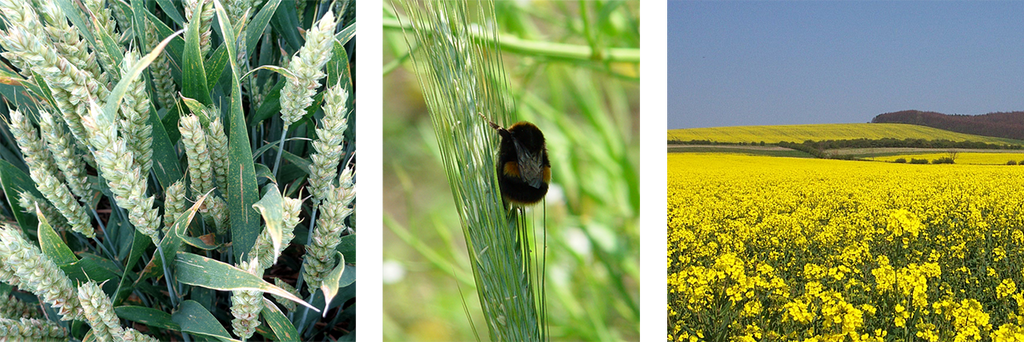insight Innovation culture
Nature vs nurture: innovation in the heart of our environment
Dr Rosie Bryson, senior principal scientist at BASF and chair of the Institute of Innovation and Knowledge Exchange, tells us about the importance of innovation in agriculture and working hand in hand with nature.
INsight
Innovation culture
Nature vs nurture: innovation in the heart of our environment
Dr Rosie Bryson, senior principal scientist at BASF and chair of the Institute of Innovation and Knowledge Exchange, tells us about the importance of innovation in agriculture and working hand in hand with nature.
Innovation seems to be the buzzword of the decade, but who or what is the ultimate innovator? A brief look at the internet’s fountain of all knowledge – Wikipedia – and you will find it describes the action or process of innovating as being “crucial to the continued success of any organisation”. I am sure Kodak would relate to that! But is this correct, and who or what is the ultimate innovator?
Innovation seems to be the buzzword of the decade, but who or what is the ultimate innovator? A brief look at the internet’s fountain of all knowledge – Wikipedia – and you will find it describes the action or process of innovating as being “crucial to the continued success of any organisation”. I am sure Kodak would relate to that! But is this correct, and who or what is the ultimate innovator?
Many of those working in very highly technical industries may view themselves as the ultimate innovators, having to react quickly to market demands and the application of new and ever faster evolving technologies. However, to me, simplistically, the ultimate innovator is one that adapts and evolves in response to complex environments in order to be successful and thrive. On this basis, surely the number one innovator is nature, closely followed by those who seek to tame it: farmers.
Many of those outside of the agricultural sector may view farming as a slow and ponderous industry using archaic and old-fashioned methods – but they would be wrong. The symbiotic relationship of nature and man that defines agriculture poses some of the biggest innovative challenges in the world.
For example, pests, weeds and diseases rise superbly to the challenges that climate, cultivation, crop host and plant protection products throw at them. In return, farmers, plant breeders, agronomists and the providers of agricultural products strive to find more and more innovative ways to try to keep them under control in order to have successful businesses and to also thrive.
Is regulation limiting innovation in agriculture?
Unfortunately, neither agriculture nor innovation are as straightforward as the coming together of man and nature may sound. The impact of external forces such as politics, economics and legislation influence our daily lives and often create a non-biological selection pressure requiring businesses to evolve. As with the pest, weeds and diseases we are often trying to control, for farmers and agricultural businesses only the fittest, most agile and innovative will survive.
Within European agriculture we cannot escape the level of politics we are facing at present, irrespective of the final outcome of the Brexit or the extremely risk-averse legislative framework that imposes so many diverse and complex regulations on our day-to-day lives. From the agricultural sector’s perspective, the question is whether this level of politics and legislation is good or bad for innovation.
“
As with the pest, weeds and diseases we are often trying to control, for farmers and agricultural businesses only the fittest, most agile and innovative will survive."
As a scientist I would say, it depends! Certainly, the costs and resources required to develop new solutions for agriculture while defending the existing product portfolio on the market has been one of the key drivers for the recent mergers and acquisitions in the industry. Some would say that this will reduce innovation and the EC has, in some cases, insisted on divestments in order to reduce this impact.
The irony is that in many ways it is the legislation of the EC itself, the complex nature and interpretation of its regulations and the extreme workload that this has created which has, in part, created the need to consolidate.
In addition, the levels of emotion that can often be aroused on innovative topics related to agriculture without an objective evaluation of the science can result in these new technologies being rejected before the true value to society has even been considered.

Drivers of Progress in the agricultural sector
However, much as we dislike legislation and the regulatory challenges it brings, it can also be argued that it has encouraged innovation and is thus a good thing.
The agricultural sector has, and keeps having to, evolve rapidly to meet the food demands of society. Despite what many outside of the industry may believe the use of big data, remote sensing technologies, new materials and novel plant protection products lie at the centre of the industry's research and development strategy.
The innovation and application of technological advances demonstrated by industry scientists across the sector would not be out of place in any leading university or institute and is often not given the level of credit that it deserves. In addition, the majority of the leading R&D based agricultural solution providers are now investing not only in the more conventional approaches to plant protection products, but are leading the way in biological approaches to pest and disease control, plant breeding and digital R&D technologies to provide a broad range of solutions for the farmer.
“
The use of big data, remote sensing technologies, new materials and novel plant protection products lie at the centre of the industry's research and development strategy."
So maybe Wikipedia wasn’t totally wrong – agriculture may not truly be an organisation, but it is a way of life and an existence as well as a thriving industry committed to the sustainability of food production.
For its continued success innovation will have to lie at its heart, but when we work cheek by jowl with the world’s leading innovator, nature, I have no doubt that the industry will continue to rise to the challenge and the fittest, most agile and adaptive will continue to survive.
